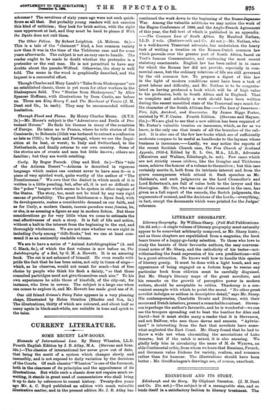continued the work down to the beginning of the Russo-Japanese
War. Among the valuable additions we may notice the work of the Hague Conference of 1899, and the Anglo-French Agreement of this year, the full text of which is published in an appendix. —The Common Law of South Africa. By Manfred Nathan, LL.D. 2 vols. (Butterworth and Co. .e4 net.)—Mr. Nathan, who is a well-known Transvaal advocate, has undertaken the heavy task of writing a treatise on the Roman-Dutch common law which prevails over the greater part of South Africa, based on Voet's famous Commentaries, and embracing the most recent statutory enactments. English law has been called in in cases for which the Roman law did not provide, especially in com- mercial cases, but the ordinary relations of life are still governed by the old common law. To prepare a digest of this law in the light of modern conditions must have been a task of great labour and difficulty, and Mr. Nathan is to be congratu- lated on having produced a book which will be of high value to his profession, both in South Africa and in England. That so complete and scholarly a work should have been written during the recent unsettled state of the Transvaal says much for the character of the South African Bar.—The Law of insurance: Fire, Life, Accident, and Guarantee. By James Biggs Porter, assisted by W. F. Craies. Fourth Edition. (Stevens and Haynes. 21s.)—We are glad to see that a new edition has been required of Mr. Porter's valuable treatise on insurance, which, as far as we know, is the only one that treats of all the branches of the sub- ject. It is also one of the few law-books which are of sufficiently moderate compass to be useful as handbooks to the layman whose business is insurance.—Lastly, we may notice the reports of the recent Scottish Church case, The Free Church of Scotland Appeals, 1903-4, Edited by R. L. Orr, M.A., LL.B., Advocate (Macniven and Wallace, Edinburgh, 5s. net). Few cases which are not strictly causes Mares, like the Douglas and Tichborne cases, achieve the honour of a volume to themselves ; but this ease certainly merits it, both from its intrinsic interest and from the grave consequences which attend it. Such speeches as Mr. Haldane's, and such judgments as the Lord Chancellor's and Lord Robertson's, are full of value both to the lawyer and the theologian. Mr. Orr, who was one of the counsel in the case, has given us a full report of the records, the Scotch judgments, the, arguments of counsel, and the decisions of the Lords,—everything, in fact, except the documents which were printed for the Judges' reference.
LITERARY GEOGRAPHY.






































































 Previous page
Previous page